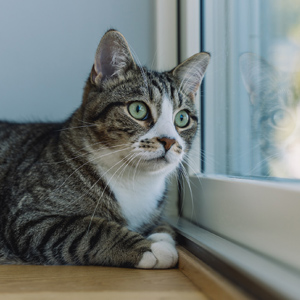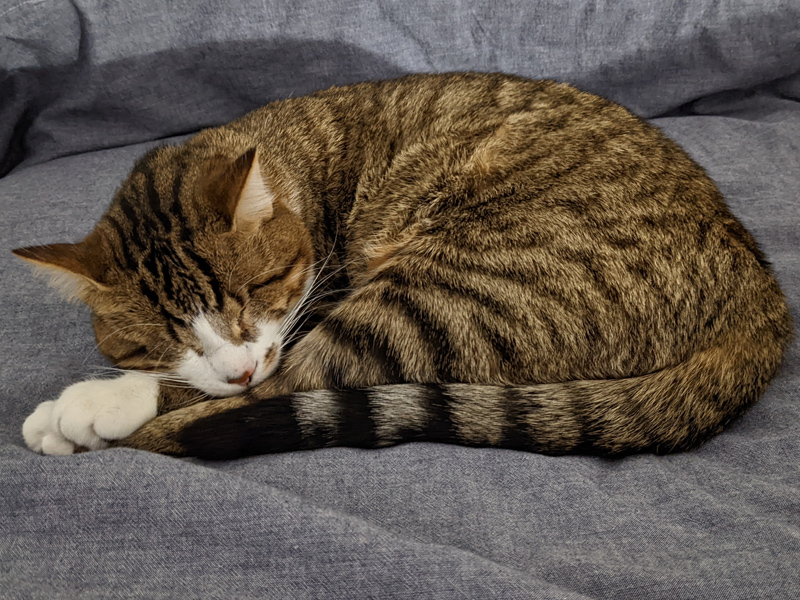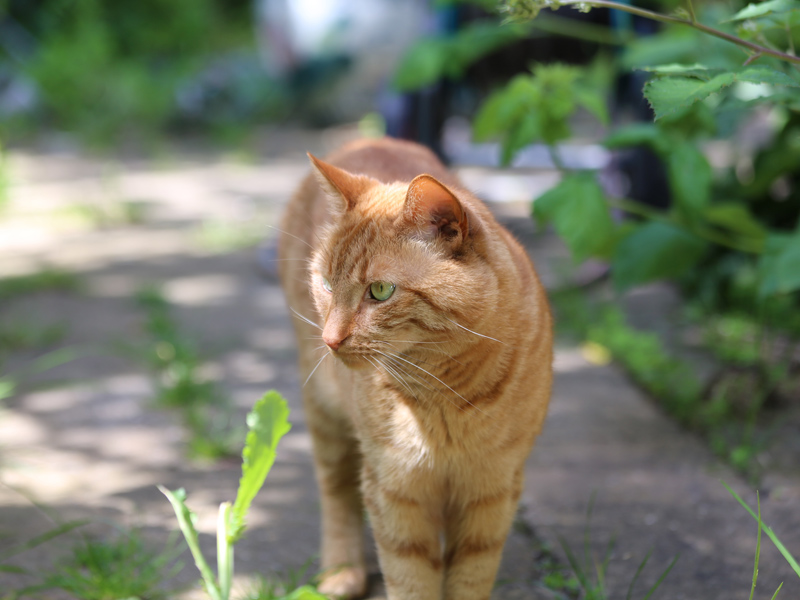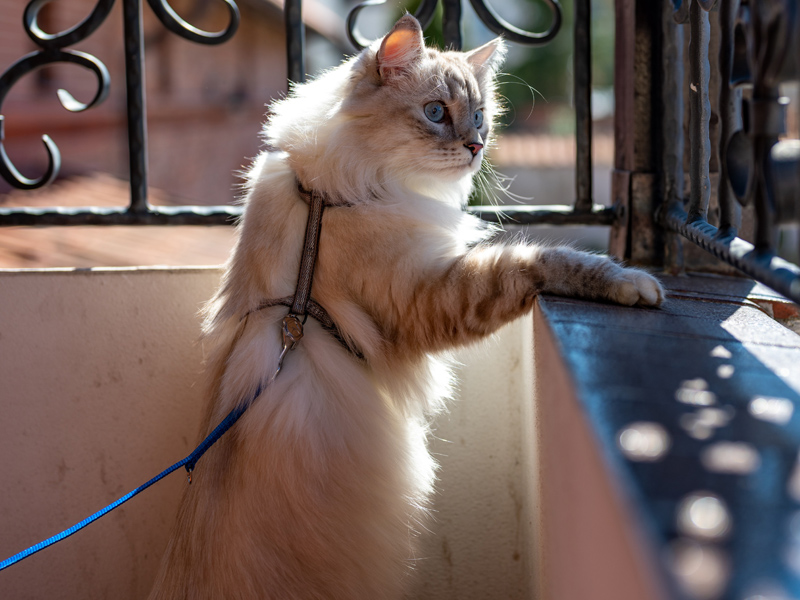Should I Keep My Cat Indoors or Outdoors?

Should I keep my cat indoors or outdoors is an often asked question by cat owners. Curiosity, independence, and an endearing attitude of “I love you but on my own terms” are some of the qualities that pet owners most love about their cats. They are also the same characteristics that may cause them to struggle with the right answer.
Some cat parents may think it wrong to deprive their felines of the stimulating outdoor environments for which it appears to yearn as it perches pensively on the window sill, eyes darting toward any other living creature or object that moves.
And still, other owners believe it best to keep their cats protected from potentially dangerous elements that may exist outdoors, beyond the borders of an enclosed yard. Suppose you’ve adopted an older cat or taken in a stray. In that case, it can be challenging to transition from outdoor to indoor living if the feline is accustomed to a particular lifestyle.
Maybe you’ve logged on to your neighborhood Facebook or NextDoor page, where long debates about whether you should keep your cats indoors or outdoors seem only to ruffle feathers and provide no substantive answers.
The decision of whether to keep a cat indoors or outdoors is a personal one and depends on several factors, including your cat’s personality, your local environment, and the potential dangers to your cat. Let’s explore the best-case scenario for each choice below.
Should I Keep My Cat Indoors? The Benefits Indicate “Yes.”
One of the primary reasons why pet owners opt to keep their kitties indoors is because doing so increases the likelihood that they will live considerably longer than their outdoor counterparts. While indoor cats live an average of 10-15 years, outdoor cats have a significantly reduced lifespan of 2-5 years.

What reasons are behind such a drastic difference in longevity? Kept indoors, cats are protected from potential threats, which come in many forms. Speeding cars, wild animals, and cruel humans are just a few forms of “predators,” while keeping cats indoors can also reduce their exposure to certain diseases and parasites, which can be communicable to other pets and humans. The list below includes just a few infectious diseases and parasites that can cause illnesses in cats:
- Feline leukemia virus (FeLV)
- Feline infectious peritonitis (FIP)
- Feline distemper (panleukopenia)
- Feline immunodeficiency virus (FIV)
- Upper respiratory diseases
- Fungal, bacterial, and viral infections
- Ticks, fleas, and mites
- Heartworms, roundworms, tapeworms, hookworms, and whipworms
- Hypothermia and heat stroke
Picking up one of these parasites or illnesses is as easy as moseying through an open field, investigating an unassuming wood pile, or snooping around an abandoned lot. Additionally, curious cats may not know better than to avoid ingesting substances like antifreeze, rat poison, or contaminated water.
Should I Keep My Cat Outdoors? There Are Several Advantages.
Depending on your living space, the great outdoors may provide infinitely more mental and physical stimulation than indoor living quarters. Outside, cats have the freedom to roam and hunt. Natural elements like trees can serve as scratching posts, potentially eliminating the tendency for cats to claw at indoor furniture.

Other behavioral problems potentially mitigated by outdoor living include urinating outside of its litterbox or “stalking” people inside the home, both of which can manifest from under-stimulation.
If you’re wondering, “Should I keep my cat indoors or outdoors?” you may feel unsure based on your cat’s eating and exercise tendencies. Spending a majority of its time outdoors may prevent a cat from overeating or resigning itself to a less active indoor regimen, which can predispose it to obesity, diabetes, arthritis, or heart disease. Cat owners may enjoy the additional benefits of
not having to empty a litterbox as frequently and having an unpaid pest control specialist on site who is adept at eliminating undesirable critters like rats and mice.
What Do The Vets Say?
The overwhelming consensus among veterinarians, when asked, “Should I keep my cat indoors or outdoors?” is to keep cats inside. At the least, outdoor cats should be kept confined at night, as this is the time when most predatory attacks and car accidents may occur.
There are many ways to create a stimulating indoor living environment for your cat, such as incorporating “hiding holes,” window seats, perches, towers, and fencing posts. Playing with your cat regularly can provide the mental stimulation it may seek. At Posh Paws, we can help you with that, too. You can even post a bird feeder directly outside the window, sure to provide thrilling content for them.
What if I Can’t Keep My Cat Indoors?
If keeping your cat inside is not an option due to housing policies, roommate allergies, or incompatible relationships with other pets in the home, consider erecting a cat patio, aka a “catio”! Research DIY catios online, where you can find affordable ideas for incorporating cat enclosures in your yard.
Remember that keeping your cat outdoors will likely mean more vet visits, so pet insurance may be a good investment. Additionally, implanting a microchip can increase the odds that your cat will be returned to you should it escape.

If you’re intent on transitioning an obstinate cat from an outdoor environment, you can take it on a daily walk. But, with a harness or a leash. The idea of a cat on a leash may seem funny. Your cat may not understand or agree with its purpose. However, leashing it on walks can “kill two birds with one stone”. Of course, without harming any actual living creatures, if you catch our drift.
Ultimately, the best option for your cat depends on its unique temperament and your specific living circumstances. If you do choose to let your cat outdoors, make sure it has a safe and secure environment to explore. Also, always ensure it’s appropriately vaccinated and wearing identification.
For more information about this subject or general questions you can contact:
Courie Dennis with Posh Paws Pet Care, LLC
843.900.0438
Visit our website at PoshPawsPetCareSC.com
Or send us a note from our contact page here.
